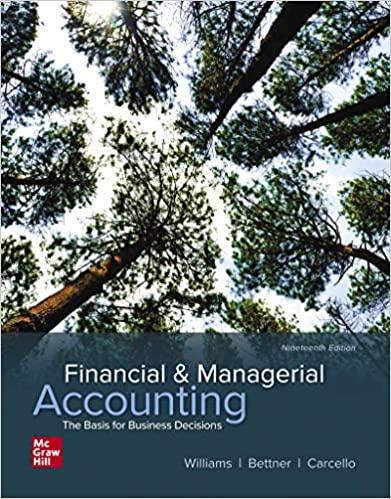Elliot-Cole is a publicly owned international corporation, with operations in over 90 countries. Net income has been
Question:
Elliot-Cole is a publicly owned international corporation, with operations in over 90 countries. Net income has been growing at approximately 15 percent per year, and the stock consistently trades at about 20 times earnings.
To attract and retain key management leadership, the company has developed a compensation plan in which managers receive earnings in the form of bonuses as well as opportunities to purchase shares of the company’s stock at a reduced price. In general, the higher the company’s net income each year, the greater the benefit to management in terms of their personal compensation.
During the current year, political unrest and economic upheaval threatened Elliot-Cole’s business operations in three foreign countries. At year-end, the company’s auditors insisted that management write off the company’s assets in these countries, stating that these assets were “severely impaired.” Said one corporate official, “We can’t argue with that. Each of these countries is a real trouble spot. We might be pulling out of these places at any time, and any assets probably would just be left behind.”
Management agreed that the carrying value of Elliot-Cole’s assets in these three countries should be reduced to “scrap value”—which was nothing. These write-downs amounted to approximately 18 percent of the company’s income prior to recognition of these losses. (These write offs are for financial reporting purposes only; they have no effect on the company’s income tax obligations.)
At the meeting with the auditors, one of Elliot-Cole’s officers states, “There’s no doubt we should write these assets off. But of course, this is an unusual and infrequent loss. A loss of this size can’t be considered a routine matter.”
Instructions.
a. Explain the logic behind writing down the book values of assets that are still in operation.
b. Evaluate the officer’s statement concerning the classification of these losses. Do you agree that they should receive some special treatment in the company’s income statement? Explain.
c. Explain how the classification of these losses will affect the p/e ratio reported in newspapers such as The Wall Street Journal.
d. What ethical dilemmas confront management in this case? Does management appear to have any self-interest in how these losses are accounted for in the company’s financial statements? Explain.
e. Explain how (if at all) these write-offs are likely to affect the earnings of future periods?
Step by Step Answer:

Financial And Managerial Accounting The Basis For Business Decisions
ISBN: 9781260247930
19th Edition
Authors: Jan Williams, Susan Haka, Mark Bettner, Joseph Carcello





